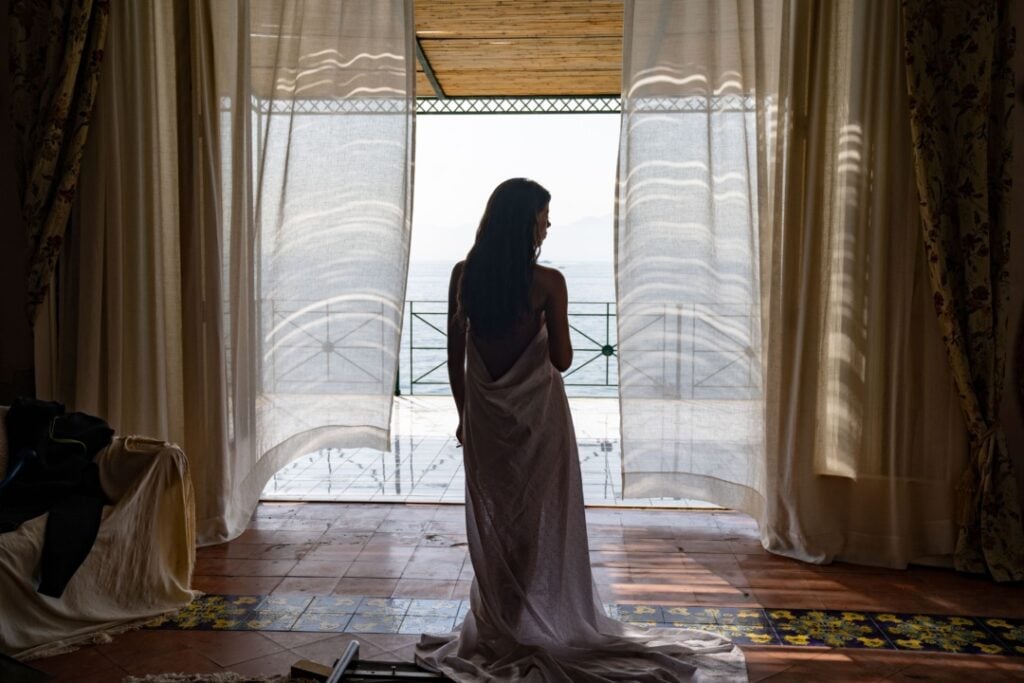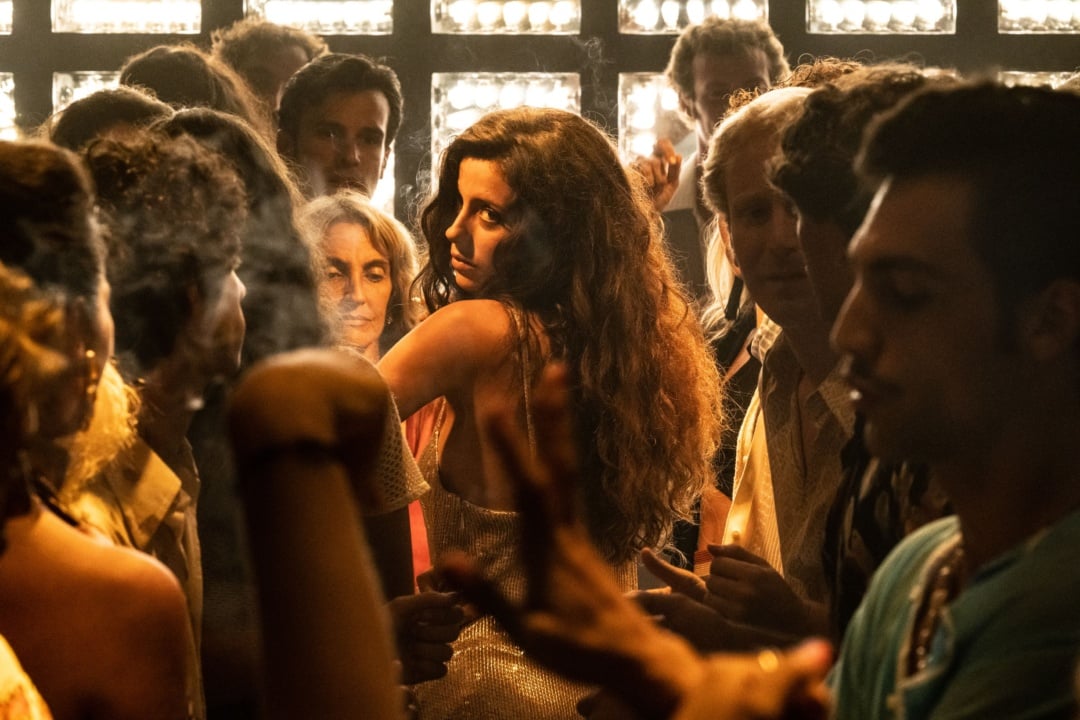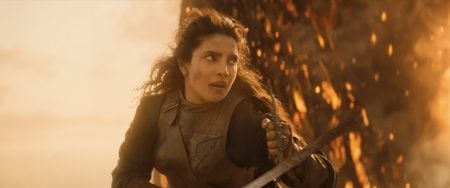When Parthenope (Celeste Dalla Porta) meets John Cheever (Gary Oldman) poolside at a resort she and her brothers have snuck onto without much money, if any, to their names, she’s not necessarily drawn to him because of how his white suit stands out amongst the speedos and bikinis that otherwise surround her. It’s more about his saddened brilliance, a characteristic she wishes to probe, to understand, to learn from. This is her way: She’s an anthropological mind, ever-intrigued by the study of humankind and its many intricacies, but not nearly as willing to reveal her own secrets as she is to ask others about theirs.
“The question that people keep asking her throughout the movie is, ‘What are you thinking about?’” Dalla Porta tells me during our interview, expanding on this thought to touch on something vital, that her character’s masked secrecy drives the people – mostly men – in her orbit mad with insecurity. They feel that because she won’t open up to them, won’t tell them precisely what she’s pondering at any given time, that they are being kept at a distance from an object they wish to protrude. She’s a fascinating creation, an impossibly beautiful woman who knows not how to harness that beauty, knows not of its power, or perhaps is just unwilling to acknowledge the fact that the world is drawn to her. She’d rather sneak through it, not unnoticed but certainly unbothered. Anonymity may not be her ultimate wish, but the state of being enigmatic certainly fits the bill she writes herself.
She’s also the first of her kind, at least in Paolo Sorrentino’s filmography. His new film, Parthenope – sharing its name with Dalla Porta’s character – is a beguiling, handsome effort that transcends what he’s explored in the past, both in terms of who it focuses on and how. Most of the Neapolitan auteur’s previous works have been seen from the male point of view – their gaze, rather – following great men as they reckon with the beautiful things around them, the people they’ve found themselves attracted to, and the worlds they struggle to populate. In his Academy Award-nominated act of grandiosity, The Great Beauty, he considers the life of a writer (Toni Servillo) who has slept his way through Rome only to find that, after a shocking revelation from his past, his life has been emptier than he realized. In The Hand of God, which also received an Oscar nomination for Best International Feature Film, Sorrentino examined his own childhood, particularly the events that followed a formative moment for a young, aspiring filmmaker. (The story was semi-autobiographical, its title referencing a holy act that changed the course of his future, just as Diego Maradona signs with Napoli football club.) Parthenope, however, flips his modus operandi on its head, imagining what a brilliant young woman might take the world for as she slithers through it like the world’s gentlest snake in the grass. The ingenue quality to Dalla Porta’s presence, not to mention her subtle, calculated performance, is what makes the film sing in its best moments.
More than anything, though, it’s a showcase for the young actress and an opportunity for an evolving filmmaker to prove that he has more than one card up his sleeve, even if it’s one from the same deck he’s been pulling from for the better part of the 21st century. It also happens to be Dalla Porta’s breakout role; though she’s worked in mini-series, short films, and as an extra in features before, she occupies the screen for much of Parthenope’s 137-minute runtime, a tall order for a newcomer that results in a remarkable turn. While it’s bound to be followed by roles aplenty, Dalla Porta is openly grateful for this moment, and she doesn’t seem hurried to move past it anytime soon.
I spoke with Dalla Porta, along with interpreter Lilia Pino Blouin, about how Parthenope came to her, how moving to Naples helped to inform her performance, and more. Here are edited excerpts from our conversation.

Geek Vibes Nation (Will Bjarnar): Congratulations on Parthenope. I just watched it this morning, and I’m fascinated by it. I think it’s a beautiful film, and I think your performance has a lot to do with that. You’ve acted before, obviously, in mini-series and short films, and you also had a part as an extra in Paolo Sorrentino’s last film, The Hand of God. But Parthenope represents a big milestone in your career. I’m curious how it came to you as a project, and just what that experience was like for you.
Celeste Dalla Porta (via interpreter Lilia Pino Blouin): Let’s just say that for The Hand of God, I did not have a specific role. I was an extra in a scene that ended up being cut. Therefore, for me, this was truly my cinema debut, and it was very exciting and emotional. It was an incredible opportunity. So I’m very grateful to Paolo Sorrentino, who gave me the opportunity to discover this character and to work on her as an actor. For me, that was a true dream, and so I could not be more grateful and happy.
GVN: I read that you had said you were “a little scared” when you were offered the part. Aside from the obvious nerves that come with any debut, what specifically scared you and how did that evolve once filming was underway?
CDP (via interpreter Lilia Pino Blouin): Well, I was scared, but scared in the sense of being emotional or excited, because this movie is such a great responsibility. You know, to be able to play a character such as this one for a filmmaker of Paolo’s caliber, this is a great responsibility. This is heavy. It’s a lot. At least I perceived it that way. I perceived it as something huge. Therefore, I was scared, meaning that I asked myself so many questions. I was wondering, “Will I be able to pull it off? Will I be able to not disappoint Paolo’s expectations, my own expectations, the audience’s expectations?” So I was scared in that sense, but it is also thanks to fear that I was able to do it.
I believe that there is a healthy component in fear, because it’s what triggers you, it’s what pushes you to do your work. And I think it’s what led me to be able to set aside the negative part of the fear and be fully immersed in the present. I realized that fear is what gets you going, but then once you are going, you need to shove it aside and be in the present, be focused on what you’re doing. And Paolo was very instrumental in me being able to do that, because he was a guide to me. He was next to me day after day, and he made me feel like I was an accomplished professional already, and not like an emerging actress [in their] first role. And that was a great gift to me.
GVN: I have two questions based off of that, actually, that are connected to something that you just said. I’ll start with this: Specifically, what were the major differences that you brought to a project where you are front and center, in front of the camera’s lens and on screen for, it seems, 95% of the film? What’s the preparation difference like for you, as opposed to working on past projects like the mini series’ Red Mirror and Beyond Passion, and the short film, Next One? What is the key difference for you as a performer between a smaller role and then something like this, where you’re thrust into the core of a project?
CDP (via interpreter Lilia Pino Blouin): The preparation stage was very, very significant. I was very lucky, because we had a lot of auditions and a lot of rehearsals, which were very, very helpful, and then we continued on with preparing the role in a very active way. After I was officially cast, we continued rehearsing with the other actors, on my own, together with Paolo Sorrentino… We worked so much, and I believe that this sort of preparation [and rehearsal] was greatly helpful. And that’s not always a given. I know it’s a privilege as an actor. I know because I have a lot of friends who are actors, and they tell me that they just jump into the set without rehearsal. They have to be ready on day one, whereas for me, it was a privilege to be able to have all that time to explore and to find the freedom that I needed.
Another thing that really helped me a lot in this particular case was moving to Naples, because I am not Neapolitan, and whereas Parthenope is Neapolitan, and the character has a lot of features that are very similar to the city’s features. Being able to move there and sort of live and breathe the city and experience everything that was in the script, everything that Paolo was talking about, and to have the opportunity to experience it firsthand, that was a significant component of my preparation stage.

GVN: About that – You say you moved there, which I think you can certainly feel. In many of [Sorrentino’s] films, the influence that the city of Naples has is paramount. But did you have a connection to the city prior to moving there for the production? And depending on your answer, can you describe how that connection or your relationship with the city evolved over the course of time as you got further into Parthenope, the production and the character itself?
CDP (via interpreter Lilia Pino Blouin): I was only familiar with the city in a superficial way. I had been before, but just for a few days. And the interesting thing is that I always wanted to get to know the city better. I kept saying, “Oh, how beautiful would it be to one day live in Naples.” So this movie allowed me to fulfill a lot of dreams, and living in Naples was one of them. I had the opportunity to become Neapolitan to some extent, and I didn’t know the city that well. This movie gave me the opportunity to immerse myself in the role of a Neapolitan person, and living there was a marvelous experience. I discovered so many different things about the city, and even now after all of that, I know that I still have so much to discover about that city because while I spent quite a bit of time there, I was working, so I didn’t really have all that time to truly experience it to the fullest.
Having said that, even the Neapolitans themselves feel like they don’t know it well enough because it’s a city that keeps evolving. It’s a mysterious city. It’s a fragmented city with so many different opportunities and so many different nuances. So, what I can say is that it was a wonderful experience, and the city is such a multifaceted, rich place, both in terms of the nature of the sea, the air, the fire, the active volcano right by it – which has such a strong impact on it – and the vitality of its people, its music. There’s so many different, interesting components to the city. And I just want to restate how grateful I am that I had the opportunity to experience it.
GVN: I think that’s amazing, that all of that could inform your performance. The last question I have is actually about your experience with the character itself. She’s clearly a free-spirited individual, but somebody who I felt to be outwardly quite secure and knowing, while there’s a subtle reserve to her as well. It’s like she wants to keep certain parts of herself within, perhaps because so many people are looking at her, gazing upon her, assuming things about her. It’s a very interesting juxtaposition for a character, and I’m curious not only if you identified with her, but how you went about informing and then becoming her.
CDP (via interpreter Lilia Pino Blouin): Yes, this character is very layered and complex. One of the main features of Parthenope is how reserved she is, the fact that she doesn’t show what she’s thinking about. And this is something that drives people around her crazy, because indeed, the question that people keep asking her throughout the movie is, “What are you thinking about?” Sometimes, when we cannot control others, when we cannot read them, we become insecure. And therefore – you mentioned that she comes off as sort of being all knowing – the effect that she produces in others is that they become insecure, because she has an inner world that she does not share, that she does not show.
This reserved nature taught me a lot as a person because she feels that she doesn’t have to explain herself, she doesn’t have to provide any motivations for her choices. She decides to do something or not do something, and she doesn’t explain it. In this sense, she’s a woman who is fully capable of being independent. She goes against convention, she doesn’t necessarily do things that others expect her to do. And this is another important part that I learned a lot from actually: I want to keep learning from that, because I think it’s a process, and it may take many years to get there, many years to become free from other people’s judgment. What Parthenope does is that she herself does not judge others; she doesn’t really judge anything. And she doesn’t allow other people’s judgment to creep through. I believe she is a teacher in doing that, and she does it masterfully.
Parthenope is currently playing in theaters courtesy of A24.
Will Bjarnar is a writer, critic, and video editor based in New York City. Originally from Upstate New York, and thus a member of the Greater Western New York Film Critics Association and a long-suffering Buffalo Bills fan, Will first became interested in movies when he discovered IMDb at a young age; with its help, he became a voracious list maker, poster lover, and trailer consumer. He has since turned that passion into a professional pursuit, writing for the film and entertainment sites Next Best Picture, InSession Film, Big Picture Big Sound, Film Inquiry, and, of course, Geek Vibes Nation. He spends the later months of each year editing an annual video countdown of the year’s 25 best films. You can find more of his musings on Letterboxd (willbjarnar) and on X (@bywillbjarnar).






